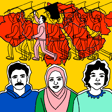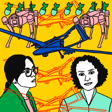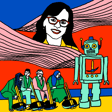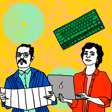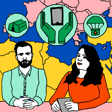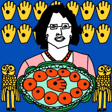Become a Creator today!Start creating today - Share your story with the world!
Start for free
00:00:00
00:00:01

3.1 Digital Rights and Big Tech in MENA
What kinds of obstacles are people in MENA facing with regards to access to technological opportunity and concerns around digital rights abuses? How are they tied to global challenges? Dr Nakeema Stefflbauer, tech executive, investor and digital rights advocate shares her thinking.
This episode also features comment from Kassem Mnejja and Marwa Fatafta of Access Now, a digital rights advocacy group. They discuss these issues in relation to Tunisia, Sudan and Palestine.
Transcript
Tech Innovations and Challenges in the Region
00:00:03
Speaker
Welcome to Season 3 of Instant Coffee. I'm Nadine Almanasvi. And I'm Sima Shehab. And this latest season is an exploration of technology and its developments in the region. Beyond the emergence of Czech GPT and Sofia the Robot, we wanted to speak with people who are applying, adapting and reimagining technology in their fields. We will be exposed to medieval Islamic hospitals, failed Gulf techno cities, emerging Iraqi fintech startups, inclusive artificial intelligence and much
Digital Rights: Open Internet and Privacy
00:00:31
Speaker
more.
00:00:31
Speaker
In this first episode, we start by taking a look at the state of digital rights in the region. We all know that we should have access to an open and free internet that we should be afforded the right to privacy and the right to freedom of expression online.
00:00:44
Speaker
But we also know that digital ethics and the laws that should be protecting these rights are not so robust, and digital incursions take place not only in MENA but globally.
Internet Blackouts and State Interventions
00:00:53
Speaker
Our main guest, Dr. Nikhima Shtafelbauer, takes us through some of the major points of concern she's encountered in her decades-long work as a tech executive, tech investor, and digital rights advocate.
00:01:04
Speaker
Her more global analysis will be complemented by specific case studies from the region, as we will also hear from Qasim Nezha and Marwa Fatafda of AccessNow, a digital rights advocacy group. Qasim and Marwa discuss internet blackouts, state suppression, and big tech collusion on the ground in Tunisia, Sudan, and Palestine.
AI Transparency and Digital Advocacy
00:01:22
Speaker
Hi, Nakima. Can you start by introducing yourself and tell us a bit more about your tech background? You also started your research looking at the MENA region, which is very interesting. Can you expand on this a bit more?
00:01:35
Speaker
I'm Madhguru Staffordbawa. I am a technology executive, a tech investor, and a digital rights advocate with a focus on AI and transparency of artificial intelligence systems for marginalized communities. I have worked in digital technology in the education, e-learning, enterprise resource planning, insurance,
00:02:04
Speaker
social media messaging areas since 2000. Prior to moving into e-learning, I worked in academia as a researcher. I was specifically focused on North Africa and Middle Eastern migration trends, informal economy, informal labor, and black market trade.
00:02:25
Speaker
Nakeemah also set up the NGO Fraun loop in Berlin, which is focused on empowering women from refugee, migrant and other backgrounds to know more about how digitization is changing traditional industries, equipping them with access to technological knowledge and skills.
Tech Access Challenges in MENA
00:02:40
Speaker
Thanks for that intro, Nakeemah. Moving on, if we look at what's happening in MENA amongst your contacts in the region, what kind of obstacles do you see playing out in relation to access to technological opportunities and awareness of digital rights? Would you say they're different to the concerns facing the students at Fraunlup or the issues we face in Europe, for example?
00:03:03
Speaker
I think it's the same challenge that you find in a lot of Western contexts, actually, with regard to women specifically. But with regard to technology opportunities, it's the challenge of the right opportunities and getting access to them once you've trained in a particular field. So let's take software engineering, computer engineering. There are tons of people studying computer engineering all over Egypt at the major universities.
00:03:31
Speaker
The problem is accessing opportunities that you can grow with, that you can rely on, is difficult. And it's one of the main drivers of people looking to move to other countries and escape from the region in order to pursue more permanent opportunities in the digital sphere.
Political Unrest and Tech Migration
00:03:50
Speaker
Also, if you look at Sudan, if you look at Tunisia, if you look at places where we've recently seen a lot more people applying for asylum, applying for work abroad, if you have a constant threat of military unrest, of government clampdowns, of being cut off from the internet entirely, it makes a lot of sense to consider alternatives to pursuing a long-term career where you are.
00:04:18
Speaker
This is really a driving force in terms of how you visualize upskilling yourself and being successful. Usually if you don't have connections locally that can help you get into the right kinds of international technology companies, you want to at least be in a sector where you can have some oversight, some control over what you're paid and how regularly you're paid and
00:04:40
Speaker
that you're gonna be able to build a longer term career. It's not to be overlooked the fact that everybody has access to the same internet. So when we're all on Instagram and we're following stories about Amazon paying its engineers 300,000 as a minimum salary, everybody in the world is seeing that and wondering why they don't have access or how they can get access and maybe if
00:05:08
Speaker
move to one of the regions where these large salaries are more typical is possible, maybe it's worth risking quite a lot to get yourself into a position to have access to those opportunities. So a lot of what I think animates people who are based in Middle Eastern contexts is a desire to participate in the same way as they're seeing Western North American Europeans
00:05:35
Speaker
participating in this digital economy and this digital universe of, you know, metaverse and blockchain and VR and AI and all of these advancements that might feel at times like they're either going to be restricted because you don't have the right connection socially and educationally at home or they might be controlled and unduly influenced by the state.
Government Restrictions on Internet Freedom
00:06:02
Speaker
And can we talk a bit more about that aspect about how the state is shrinking online space? I mean, you can just look at Turkey. It's it's a very good example of how, you know, the government has made very clear its desire to remain at the center of all digital communication that happens within the country, especially post coup, which we many of us watch live happening on Twitter.
00:06:28
Speaker
I think it's not to be underestimated the sensitivity that people have to growing up in a country where your government does not allow you to get online without IP addresses being available, being clearly delineated, public space, Wi-Fi access is the same.
00:06:47
Speaker
you need to identify yourself in a way that the government can find you if they want to. This is not the same internet as what was sold to many of us decades ago as surfing anonymously, meeting people, connecting all over the world. This is a different experience. It's similar, I think, in most countries. Jordan, certainly Palestine, Syria, Sudan, Lebanon, everyone is aware that
00:07:15
Speaker
Even if you don't have a centralized and a strong internet, strong man, you know, controlling traffic, you can never be sure whether some agency, some entity is not policing your activities online.
00:07:30
Speaker
as we've learned from various documentary exposés, your tweets on the X platform, anything that you do that is not both virtual private network protected and probably anonymized, you can be at risk. So it's not just the feeling of being less free to express yourself without a pseudonym and elaborate anonymization procedures when you're at home. It's also the feeling that
00:08:01
Speaker
If you have any additional concerns, like you are politically active, you are a member of an LGBTQ community, you identify with any areas that might be under special scrutiny, you know, the whole digital landscape is much less safe for you. As well as shrinking space, states in the region have also carried out disruptive and total internet shutdowns at times.
Internet Shutdowns: Control and Cheating Prevention
00:08:23
Speaker
Qasim Nezha, Mina campaign or Access Now, is involved in the global campaign called Keep It On, working against internet shutdowns.
00:08:30
Speaker
A lot of countries use internet shutdowns as a tool in order to silence critics, to suppress a lot of people on the ground, but also to hide a lot of crimes and atrocities that unfortunately happen. But maybe one thing that is specific to the Middle East and North Africa region is a lot of internet shutdowns during exams. So for some countries, it could be like a complete blocking and shutting down the internet in specific areas.
00:08:55
Speaker
But in other countries, it could be blocking of some communication apps and some social media messaging apps in order to, again, the excuse and the argument that these governments present is to prevent cheating. A lot of people think that shutting down the internet during exams
00:09:13
Speaker
is not really done in the sense that it's going to completely stop cheating, but it is a way to even more control the online space. It's a tool that a lot of governments use as an excuse, but again, there's no statistics that back up that, you know, Internet shutdowns during exams have been effective in preventing cheating.
00:09:34
Speaker
Internet shutdowns are just one part of it. But then again, when you see that there's a lot of issues when it comes to accessibility, when it comes to connectivity, when it comes also to legislation, when it comes to trying to control the online space, whether through cybercrime legislation or laws and regulations that try to control the online space.
00:09:56
Speaker
And we've seen different examples of how an open internet space can help and can usher more opportunities for young people when it comes to education, when it comes to businesses. If you take the example of Tunisia, during the era of Ben Ali, it was a rampant censorship. YouTube and other websites were blocked for years. A lot of young people were frustrated.
00:10:16
Speaker
But then again, at that time, not a lot of people were very conscious about VPNs, virtual private networks, and around tools that try to circumvent these kind of restrictions and measures. Some people had to take risks and use VPNs in order for them to get news and see what was really happening.
00:10:33
Speaker
There was a lot of frustration among the youth, which made Ben Ali promise the removal of these restrictions in his final days of power. And then when you see the situation now, it's very different in the sense that an open internet in the country has presented more opportunities, jobs, tools for learning, and overall, it increased the reliance on the internet for work and education.
00:10:54
Speaker
It is important for governments in the region to understand when you control that it is, of course, going to make a lot of people think twice about the decision, whether they stay in their countries, whether they open businesses in their countries or not, versus maybe moving to another country that they're going to find a more welcoming space and a better space where they can function and when they can operate or do their work as studies without these kind of restrictions that sometimes can be very costly on their lives.
00:11:23
Speaker
And we wanted to talk to you about Sudan. We've seen a lot of comments on the lack of social media output in relation to say, for example, Palestine due to the heavy control of the internet in the country. Can you speak to the situation at all?
Internet Shutdowns in Sudan and Human Rights
00:11:35
Speaker
Sudan, unfortunately, is one of the countries that we have documented and that we've seen a lot of cases of internet shutdowns. We see that internet shutdowns have unfortunately been used as a restrictive tool during political transitions and times of upheavals during the past few years in the country.
00:11:53
Speaker
We see that usually amid protests and street demonstrations, the different military regimes have resorted to cut enough internet access multiple times and for extended periods as well. Unfortunately, their internet shutdown has been used as a cover-up for some human rights violations and atrocities that have taken place on the ground.
00:12:15
Speaker
And more often than once, unfortunately, we come across graphic reports of violence that emerge whenever the internet is restored. By shutting down the internet, you know, this is usually a tool or something that is used in order to make political organizing and the exchange of information about protests, needs and people involved. It makes it a bit more complicated. There was this NGO that is called the Sudanese Consumer Protection Society.
00:12:43
Speaker
that has advocated in the past against internet shutdowns and it managed to take the government to court and the court ruled in its favor and then it ordered the restoration of internet services in the country. So this was a big victory for the people in Sudan but also across the region and this triumph you know unfortunately it didn't mark the end of shutdowns
00:13:05
Speaker
And this was one of the cases where we've seen government response and more government crackdown because just one year later, we've heard from the head of the Sudanese consumer protection society that the organization's permit was revoked by the government.
00:13:20
Speaker
So this was a significant blow to the efforts of internet defenders. And I feel that it kind of sent a message to activists and lawyers, not just in Sudan, but also across other countries in the region that challenging the government when it comes to internet shutdown or when it comes to these restrictive measures that they use can lead to such decisions, can lead to such actions, and can sometimes lead to more crackdown.
Challenges for Marginalized Groups Online
00:13:49
Speaker
While internet shutdowns and control of the digital sphere have broader implications on the general public, we asked Nakima more about the specific ways marginalized groups are affected. It is useful to know how women, for example, can be empowered to gain knowledge and skills in tech, but we wanted to dig a bit deeper. We wanted to find out how Nakima understands new advances in digital technologies as suppressive and how exactly they're moving in more discriminatory directions.
00:14:14
Speaker
From my perspective, there's no difference between how women in the region and women in New York or Berlin are struggling to take control of their own narratives online because we're all up against the same challenges, which is an increasingly automated set of technologies being deployed on the internet that seek to categorize, segregate,
00:14:37
Speaker
and replicate the same types of stimuli for users, clients, whatever you want to call them, people who might eventually be monetized, data might be monetized. So it's the same challenge to
00:14:55
Speaker
Cover your tracks, not be tracked everywhere you go online by cookies. Try not to upload pictures of your face or your family that can then be scraped and incorporated into databases and algorithms that are meant to predict you know not what.
00:15:14
Speaker
this is the same challenge that we all are facing. I gave a recent workshop to Fraunlup students and mentors in Berlin. That's what it was about. It was called Exercising Your GDPR Rights. It was actually about protecting yourself online.
00:15:32
Speaker
Everybody needs to learn how to do, you know, it was about learning how to cloak and mask your images. It was about searching the open source databases that exist to see whether or not your name, your likeness has been used in training data sets. The lion training data set in particular released by Facebook so that you can get an understanding of what
00:15:53
Speaker
might be associated with your name, your likeness, if you're artistic, you know, your artistic output. All of these things are freely available. None of them have a cost, but nobody knows about it. And, you know, I'm trying to think about how I would feel if I were sitting in any Middle Eastern country and I were seeing the same narrative that we see in the West, which is, you know, men run
00:16:19
Speaker
technology, white men specifically, are the geniuses and the visionaries behind every tech platform and every tech company and trying to make sense of how to navigate that environment when the times that you hear women mentioned, it's usually about deep fakes, non-consensual porn.
00:16:38
Speaker
All kinds of things that suggest not only a lack of control, but a constant need for vigilance and care that maybe men don't have, maybe, you know, non-minoritized people don't have. So I think, you know, what I hope for the future for people in the Middle East in general is a recognition of, you know, the very neo-colonial nature of the internet.
00:17:05
Speaker
and the data that's being produced and being replicated and by whom, and understanding that there are ways and tools without getting too technical to protect yourself online and to maintain your privacy.
00:17:20
Speaker
as a human being, because that should be a tenet of your digital experience, of the right to privacy. And an understanding that there are initiatives siloed in different parts of the world, but there are initiatives underway if you look under decolonizing. You focus on the decolonizing label where people are trying to reclaim their language.
00:17:42
Speaker
online, their images, and their right to sort of exist and to define for themselves how and what is going to be presented when you google Arab or Muslim or whatever the specific subset you belong to is online.
00:18:04
Speaker
And you should be able to do that because nobody should have the experience that many of us got familiar with, with Sophia Noble's algorithms of oppression, where you Google black woman, black girl, and you get porn, you know, where you get incredibly insulting imagery that does not represent your family, yourself, you know, your elders. It'd be nice if you're going to wholesale switch everyone to using
00:18:32
Speaker
certain kinds of technologies over others, at least shouldn't they work for vast majorities of the country, of the populations that potentially you want to monetize into customers?
00:18:45
Speaker
The fact that you still have facial recognition technologies, you still have natural language processing applications that fail to recognize dark-skinned people, that fail to recognize accents outside of a very narrow band of English, usually.
00:19:03
Speaker
What does that mean for all of us who grew up speaking accented English or other languages who might speak dialect typically with their families and their elders? What happens to all of this exchange and all of this culture and lived experience when we move towards an internet that's exclusively delivered by large multinational US or UK companies?
00:19:31
Speaker
Multinational companies and the rise of big tech play an important role in how we understand these standardisation drives in artificial intelligence and new technologies. In addition to these concerns, increased interest by states in collaborating with information technology companies raises concerns for freedom of expression and the right to privacy.
00:19:50
Speaker
Again, we wanted to find out more about what this kind of collaboration looks like on the ground.
Suppression of Palestinian Voices
00:19:55
Speaker
Maro Fortafta, Mina Policy and Advocacy Director at AccessNow, spoke to us about how social media monitoring and the role tech companies plays out in Palestine, both before and during the latest violence since October 7th, 2023. Right now it's a very scary time for freedom of expression in Palestine.
00:20:13
Speaker
Until 2015, the Israeli Authority started accusing social media platforms for being hub for terrorism and for radicalizing Palestinian youth and started opening these kind of backdoor deals with social media companies to remove content.
00:20:30
Speaker
Back then in 2016, the Israeli authorities established the so-called cyber unit, which is a unit within the attorney general's office that monitors and reports content that, according to them, of course, incites the violence or encourages terrorism to social media platforms for them to remove. And they've also deployed
00:20:55
Speaker
pretty draconian technology such as, you know, predictive policing tools that comes through social media content and flags individuals. And by individuals, I mean Palestinians, because that's the target of such technologies that may, may commit an attack in the future. And since 2015, we've seen this wave of hundreds of Palestinians, especially teenagers or young people been arrested
00:21:24
Speaker
for their social media posts or social media activity. For example, the system was made to recognize if people change their profile pictures, which is seen as an indication that this person is about to commit an attack and they want to have a nice photo. So once they're martyred, that's the photo is shared among their family and in the press.
00:21:48
Speaker
So really twisted logic into how the Israeli authorities weaponized different tools and new technologies in order to monitor what Palestinians are saying and clamp down on that. Pretty much since I started working on digital rights in Palestine in 2015,
00:22:04
Speaker
We see this systematic pattern of censoring Palestinian voices and suppressing their narratives by social media companies and tech platforms in general. Whenever there is an escalation in violence on the ground, we see match to that.
00:22:21
Speaker
an escalation of censorship and digital repression. And so right now, since October 7th, we've seen how platforms and particularly META, and although META says that they're not implementing any type of content moderation actions that suppresses or demotes Palestine related content,
00:22:43
Speaker
user experiences are, they tell a different story. And there are hundreds of people who said, since I started posting about Palestine, my reach has been reduced. And then also we've seen some new measures, for example, for popular Palestinian accounts on Instagram that have been active
00:23:04
Speaker
since October 7th. People who go to their page or want to follow them, they get this prompt from Instagram saying, are you sure you want to follow this account? It has violated our community standards for a number of times, or they have been sharing this information. We have been in contact with the platforms. We have been raising and escalating those cases as they arise. We have been also challenging the platforms and their public messaging, especially when we saw
00:23:34
Speaker
some egregious embodiment of the discrimination and the racism inherent in these content moderation systems and policies.
00:23:45
Speaker
example being when Instagram's auto-translation translated the bios of users who had the Palestinian flag and words like alhamdulillah into Palestinian terrorists are fighting for their freedom. And Instagram, I mean, Meta came up and said, sorry, that was an error in our system, which has always been their standard line that the systematic censorship we see and we document over the years, and not just since the start of 2020,
00:24:15
Speaker
of October 7th is a matter of technical glitch and technical errors. And we launched this collective campaign calling on Mehta to stop silencing Palestine and demanding that they really overhaul their discriminatory and biased content moderation system that
00:24:35
Speaker
again and again as censors, not only Palestinians, but also anyone who speaks up on Palestine, generally speaking marginalized communities in Syria, in Yemen, in Ethiopia, in Myanmar, populations that are enduring horrific types of violence and they need social media
00:24:57
Speaker
to share their realities and to get attention when there is none from global media. And we see that unfortunately those types of communities who are most at risk are not prioritised, their safety is not prioritised, their freedom of expression is not prioritised. And with that in mind, how has Israeli control of the internet and access to internet technologies changed during the current violence?
Internet Access Control in Gaza
00:25:22
Speaker
I look at the genocide right now in Gaza. It's a humanitarian catastrophe of an unspeakable scale. There is ongoing internet shutdowns and disruptions. Since October 7, we have been following closely connectivity status. Since the start of the war, there's been 10 complete communications.
00:25:41
Speaker
blackouts. Since October, we saw that the Israel authorities have been bombarding telecommunications infrastructure and internet service providers. The connectivity in Gaza plummeted by 80% and the majority of internet service providers have not been working. I think the last time we checked as of January 9th, 12th of the 19th
00:26:03
Speaker
internet service providers in Gaza are not working or shut down, either because their infrastructure has been destroyed and damaged because of the heavy bombardment, or because they ran out of fuel because of the complete sage, Levido in Gaza, by the Israeli authorities, or because Israel simply is toying with the internet.
00:26:21
Speaker
At the end of the day, they have full control over the Palestinian infrastructure, all the gateways and cables that connect Gaza with the rest of the world run through Israel. And the Israelis have been also quite open and clear about that. I mean, the Ministry of Communication had said in the beginning of the war that they are considering Internet shutdowns in the Gaza Strip in order to hinder people from communicating with each other and also to hide the trails of their crimes.
00:26:51
Speaker
During political upheaval, big text responses to upholding freedom of expression have been inconsistent. But what options are there for meaningful change? We asked Nakima where her thinking lies for the future and how these recommendations that she makes go down in her conversations and presentations that she delivers to tech companies, policymakers and other interested groups.
Global Advocacy for Digital Rights
00:27:11
Speaker
How do people respond? Luckily, I've gotten really good responses from people in policy positions and policymakers tend to be among the most outraged about how the abuse is in North America.
00:27:24
Speaker
the abuses that are cropping up more and more in the UK, how they get stopped within Europe. But I think that what about if you're not in Europe? What about if you're sitting in Egypt, if you're sitting in Morocco and one of these countries where the governments seem incredibly eager to get their hands on the latest
00:27:44
Speaker
artificial intelligence algorithms so that they can pilot unmanned warfare drones, so that they can use the latest screening and crawling algorithms to find out where all of the dissenters are within their own countries.
00:28:01
Speaker
You may not be able to get to the right people with information, um, at the right times. And it's really important to do that because as I said, the message is the same from my perspective everywhere. You are entitled to use the internet for what it was built for, which is to connect with people in different circumstances and different parts of the world and different levels without barriers. And you are meant to be able to.
00:28:30
Speaker
I think navigate with some degree of security that your words, your images are not going to be used against you. And that's what it really becomes when we're talking about investigating how algorithmic recommendations and predictions can work against and tell lies.
00:28:51
Speaker
about the people, the communities, the populations that are being referenced. I think that that's the main challenge is getting that message out ahead of all of the technology boosters who are saying that
00:29:06
Speaker
These are edge cases. These are minor tweaks that need to be fixed. And then we can go back to full-time reliance on and hyping of these technologies as being the best way forward. It would be really worth having conversations with Black in AI, which is a machine learning
00:29:25
Speaker
organization, global organization, co-founded or founded by Timmy Kebru, Deep Learning Indaba, which last year was held in Tunisia. These are the kinds of places and spaces where technologists who are familiar with the technology, who understand the challenges of
00:29:43
Speaker
contributing to open source networks from the global south can speak to what it means to be able to get access to their peers in different parts of the world without the mediation of a big tech company that wants to police what is said and what is focused on.
00:30:06
Speaker
Thank you so much for listening to Instant Coffee, a podcast brought to you by the LSC Middle East Center. Join us every other Tuesday for a new episode. To find out more about McKeen's work, as well as the advocacy campaigns of Access Now, follow the links in the podcast description.
